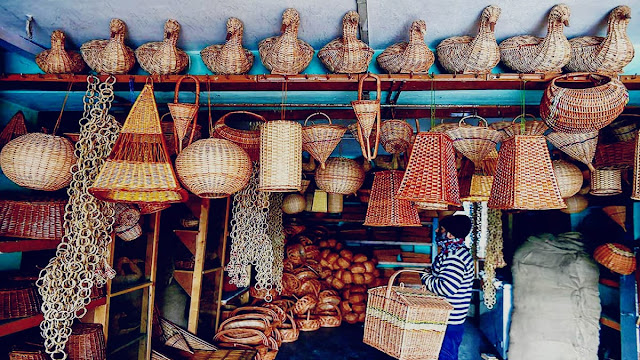
Wicker worker's worry
By Mir Rameez Raja
Srinagar: October 25
Ganderbal:
 ADS
ADS The wicker work of Kashmir is known for its exceptional quality and meticulous craftsmanship, as artisans devote themselves to the minutes of detail. The unique beauty and durability of this product have garnered popularity not just within India, but also also on an international scale. The wicker products hailing from Kashmir have garnered significant attention due to their exceptional artistic value and remarkable and functionality.
The Shallabugh area, located in the central Kashmir's Ganderbal district, has emerged as a primary source of wicker-related products. Shallabugh village, renowned for its distinctions ‘model village’ back in 2002, has emerged as a primary hub of willow basket production in the region of Kashmir.
In a meticulous process, willow twigs are cultivated and subsequently harvested, before being carefully arranged into bunches based on their specific length and width. According to Abdul Hamid, a willow worker from Shallabugh Ganderbal, each bunch is subjected to boiling in a larger boiler. Following this, the bark is peeled off and bunches are left outside to dry in the sun.
 ADS
ADS Wicker workers in Kashmir, much like their counterparts in various regions, encounter distinct challenges and concerns that are exclusive to their craft and locale. In the face of these concerns, numerous. Kashmiri wicker workers exhibit a sense of pride in their craft and diligently strive to uphold their age-old traditions. With the backing of local and international organizations, fair trade initiatives, and a growing recognition of the exquisite allure of Kashmiri wicker work, there is potential for addressing a portion of these obstacles.
Artisan Ghulam Rasool Khanday expressed his thoughts on the laborious process of interweaving thin and flexible reeds into exquisite products. Despite the immense skill and effort required for this craftsmanship, Khanday lamented the wages received by the skilled workers. According to him, an artisan is only compensated with a mere two to three hundred rupees per day.
Decorative wicker made items including baskets and Kangris, on display at a shop in Srinagar's Hazratbal. (Photo: Mir Rameez Raja)
In a statement, Khanday, a seasoned craftsman, revealed their extensive experience spanning over four decades. He further expressed concern over the significant decline in the demand for wicker craft, which has had a profound impact on their ability to provide for their family’s daily necessities.Workers express dissatisfaction with the perceived lack of Government support, citing the absence of assistance programs and the difficulty in obtaining bank loans.




0 Response to "Wicker worker's worry"
Post a Comment